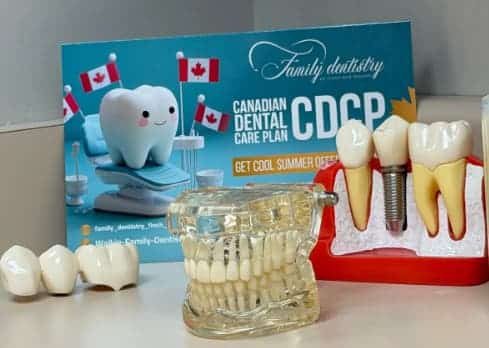A question that many people ask is How often should I replace my toothbrush? If you’re like most people, you grew up hearing your dentist and family members telling you that you need to brush your teeth twice a day for two minutes each time. However, they may not have told you about how often you should change your toothbrush. Using the same toothbrush for too long can render it less effective and may even do more harm than good.
In this blog, we’ll explain how often you should replace your toothbrush, in addition to all the tips and tricks that we give to our patients during their dental cleaning sessions.
Walk-in Family Dental
Do You Need Emergency Dentist?
Walk-in Family Dental provides quick and expert care for dental emergencies, including toothaches and knocked-out teeth.

How Often Should You Change Your Toothbrush?
You should replace a manual toothbrush every three to four months. If you use your brush for much longer than that, the bristles will start to become frayed and worn, and they won’t be as effective at clearing away plaque. When too much plaque and food debris linger in your mouth, your risk of tooth decay and gum disease increases.
According to the Cleveland Clinic, there may be times when you need to replace your toothbrush sooner than 3 to 4 months. For example, the bristles lose their shape, there are germs from colds, flu, or infections on your toothbrush, it falls on the floor or near the toilet, or it smells odd or has residue even after rinsing. In these situations, you should renew your toothbrush sooner than the recommended time.
Read more: Tips to Keep Your Teeth Healthy and Safe

How Often Should You Change Your Electric Toothbrush?
Electric toothbrushes are highly effective at cleaning teeth, but their heads still wear out over time, just like regular toothbrushes. Dentists recommend replacing your electric toothbrush head every three months, or sooner if the bristles look frayed or worn. Worn bristles can’t reach all the grooves in your teeth, reducing cleaning efficiency and allowing plaque and bacteria to build up.
Pro tip: Some electric toothbrush heads have colored bristle indicators that fade over time. When the color fades, it’s a simple reminder that it’s time for a replacement.
The Importance of Regular Toothbrush Replacement
Over time, toothbrush bristles become frayed and worn, making it harder to remove plaque and food particles effectively. This can lead to cavities, gum disease, and even bad breath. A fresh toothbrush ensures that every brushing session cleans your teeth properly, keeping your smile healthy and bright.
Your toothbrush can also harbor bacteria, especially if it’s used for several months without replacement. Germs from your mouth can accumulate on the bristles, and using the same brush repeatedly may increase your risk of reinfection, particularly after being sick. By changing your toothbrush regularly, you minimize bacterial buildup and protect your overall oral hygiene.
Finally, for children and adults alike, a worn-out toothbrush simply doesn’t do its job. Kids’ brushes wear out faster due to chewing and playful brushing, while adults may unknowingly brush too hard, bending the bristles. Staying on top of toothbrush replacement ensures that your brushing technique is as effective as possible, giving you cleaner teeth, healthier gums, and fresher breath.

Dental Crown Loose or Missing? Visit Us Now!
Want more than just a clean toothbrush? Nothing replaces the freshness of a professional dental cleaning. At Walk In Family Dentistry, we help you maintain strong teeth and healthy gums with gentle, thorough care. Book your appointment today and give your smile the attention it deserves.
Factors Affecting Toothbrush Lifespan
The lifespan of a toothbrush isn’t always the same for everyone. Several factors can make a toothbrush wear out faster or last longer, and being aware of them can help you know when it’s time to replace it.
- Brushing technique: Brushing too hard or using excessive pressure can fray the bristles quickly, reducing the toothbrush’s effectiveness. Gentle, thorough brushing is better for both your teeth and the brush.
- Frequency of use: The more often you brush, the faster the bristles wear out. People who brush multiple times a day may need to replace their toothbrush sooner than those who brush once or twice daily.
- Bristle type and quality: Soft-bristled brushes are recommended for most people, but lower-quality bristles may bend or break more easily. Higher-quality brushes tend to last longer and maintain their shape better.
- Storage and hygiene: How you store your toothbrush also matters. Keeping it in a damp, enclosed space can promote bacterial growth and weaken the bristles. Always rinse thoroughly and store your toothbrush upright in a well-ventilated area.
Further Reading: Why a Dental Checkup is Important?

How to Make Your Toothbrush Last Longer
To ensure your toothbrush in good condition for as long as possible, follow these tips:
- Don’t keep your toothbrush in a place where it could come into contact with the head of another toothbrush. This makes it all too easy for germs to spread to everyone in a household.
- Always rinse off your toothbrush after brushing your teeth.
- Don’t store your toothbrush in a closed container. This creates an ideal environment for bacteria and mold to grow.
- No matter how close you are with another person, never share your toothbrush.
- Do not use mouthwash, soap, or other disinfectants to clean your toothbrush.
If you want to keep your mouth as healthy as possible, it’s crucial to maintain a good oral hygiene routine. That includes using all the right dental tools, and an old, frayed toothbrush is not one of them. Make sure that you are replacing your toothbrush and visiting your dentist for checkups and cleanings on a regular basis. It will help keep your smile healthy and bright!
Wondering how often you should visit your dentist? Check out this article: How Often Should I Visit a Dentist?
Do Not Delay Replacing My Toothbrush for Better Dental Care
Replacing your toothbrush regularly is one of the simplest ways to protect your teeth and gums, but it’s only part of keeping your smile healthy. Professional cleanings play an equally important role in removing plaque and checking for early signs of dental issues.
At Walk In Family Dentistry, our team is here to help you keep your oral health on track. Book your first appointment today with our professional dentist in North York and enjoy the confidence of a fresh, healthy smile.
FAQ
Can an old toothbrush cause bad breath or oral health issues?
Yes. Worn-out bristles can’t clean properly, and bacteria buildup on the brush may lead to bad breath, plaque, or even gum problems.
Do children need to replace their toothbrushes more often than adults?
Usually, yes. Kids often brush with more pressure and chew on bristles, so their toothbrushes wear out faster and may need replacing every 2–3 months.
Should I change my toothbrush after being sick?
Definitely. Germs can linger on the bristles, so swapping your toothbrush after a cold, flu, or infection helps prevent re-infection.
Do I replace electric toothbrush heads more or less often?
The rule is about the same: every 3 months, or sooner if the bristles look frayed. Electric heads are smaller, so they may even wear out a bit faster.
How often do you replace your toothbrush? Have you ever noticed a difference in your oral health when switching to a new one? Share your thoughts and tips in the comments below; we’d love to hear from you!



